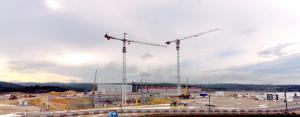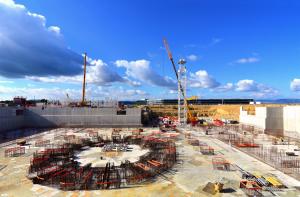Three giants take position on the platform
Giants... Three of the five cranes planned for Tokamak Complex construction activities will rise over 75 metres (76 m, 80 m and 82 m) and have lifting capacities of 6-8 tonnes at the tip of their 55- to 65-metre-long booms.
The giants will not be alone. As wall erection is due to begin before the end of this month, two other cranes ranging in height from 55 to 63 metres "under the hook," are in various stages of assembly. One, the central crane (52 metres high), will be anchored right in the middle of the Tokamak Complex basemat slab. Equipped with a shorter boom (35 metres), it will handle loads of up to 9 tonnes.
Operating in a relatively restricted area, the Tokamak Complex cranes will be guided by sophisticated interference software that will coordinate their movements and ensure the safety of the handling operations.



